In and Out of Africa
In The Cradle of Humankind
The Tanzanian border crossing involved a seemingly endless amount of paperwork, most of it in triplicate. There was also the 'foreign registration' fee for the truck. This brought to mind the fat official in Niger and this official was also fat (most of them were). The fee, however, appeared to be genuine and involved it's own forms, also in triplicate, as well as a receipt. The fee was for the 35 GBP payable in foreign currency only and any vehicle with foreign plates was liable, even if those plates were Kenyan. The permit did last for about three months with multiple entries but it did seem rather expensive, especially for locals taking produce to and from Kenya. Tanzanian officialdom seemed particularly avaricious when it came to extracting foreign currency from any body who had it.
Our early start was rewarded by another hour of spectacular views of Kilimanjaro before it was once again shrouded in it's daily cloak of cloud. The road on the Tanzanian side was in markedly worse condition than on the Kenyan side and there were no sign posts. It was a great relief when we finally arrived at Moshi and a tar sealed road. The banks however were shut and there is very little that can be done in Moshi with no local money. We headed on towards Arusha where at least there were hotels where we could change money. I was particularly interested in seeing Arusha as my brother had spent 9 months here doing engineering work. Someone had sold High-Tech machine tools to a local company. Within months of these machines being installed all four of them were no longer functioning. My Brother had the unenviable task of going out there, after the fact and trying to sort the problems out. Imagine if someone had picked a village in Europe or America, with several centuries of technological culture behind them, and installed four machines and walked away. It is unlikely that much would be achieved with these machines, even if somebody knew vaguely what they were used for. Now transpose this to a village in Africa where the people who have no technological culture of their own, have only been exposed to someone else's for less than a century and only been allowed to control it for less than a generation. I toyed with the idea of finding the factory and saying hello. It was not clear whether I would be welcome or not. They may assume that I am an engineer like my brother and expect me to repair the machines. I would be no more able to do this than the Africans.
It is easy to say that the salesman who sold the machines in the first had taken advantage of a little company in Arusha. Dropping this gift of modern technology in their laps and then standing back and saying "Hey, it's not my fault they broke the things is it!. We installed them and left the manuals just like we always do". Obviously the only gain here is for the company who sold the machines, not the people of Arusha. Yet people stand back and look at Africa and it's downward spiralling economies, it's famines and it's wars and blame the Africans or the weather. The colonial powers swept into a continent largely without technology, party politics, two story houses or flush toilets. Allowed the local population to take a menial role in this new society. Then they all leave saying 'here you are it's your ball, we've let you watch us play, you should have worked out the rules by now'. It is like trying to work out the rules of Cricket or American Football by watching half a game on television. It is hardly surprising that the game now being played in Africa is using different rules to the rest of the World. When the colonial powers left Zaire they didn't even leave the manuals so is it a surprise that the country doesn't seem to be working.
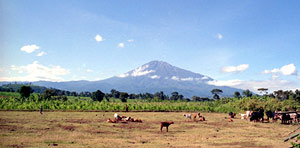 |
| Mount Meru |
|---|
The road to Ngorogoro itself is however a particularly badly corrugated unsealed road. There is nothing I hate more than corrugations. The approved driving method is to drive at a speed between 50 km/h and 70 km/h at which the frequency of the corrugations is cancelled out by the oscillation of the springs. This means you are literally flying over the road with your wheels briefly touching the crests of the corrugations. It also means you have almost no control and are going too fast to avoid large obstacles. At this speed your whole body is constantly vibrating and any loose fillings in our teeth may drop out at any moment. The alternative is to drive slowly enough to be in control but to be shaken so violently that your teeth will chip and your bones feel like they will shatter at any moment. In practise I chose the higher speed, higher risk, but less bone destroying option. It may be more comfortable but it is hard on the drivers nerves and even harder on the suspension. After one long stretch of corrugations the shock absorbers were almost too hot to touch.
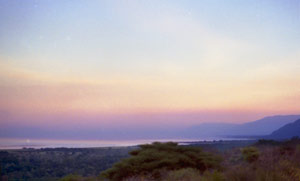 |
| Ngorogoro sunset |
|---|
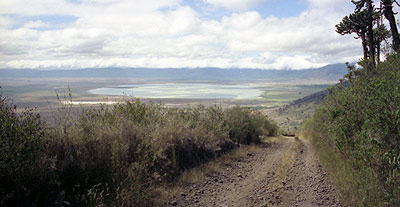 |
| Ngorogoro crater |
|---|
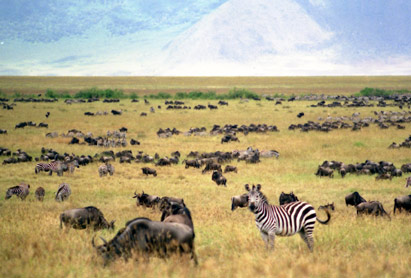 |
| Wildebeest and Zebra |
|---|
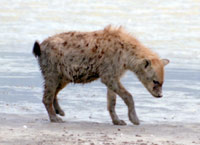 |
| Spotted Hyena |
|---|
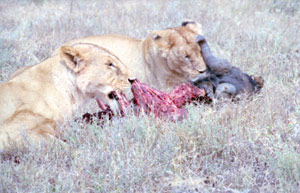 |
| Lions Eating |
|---|
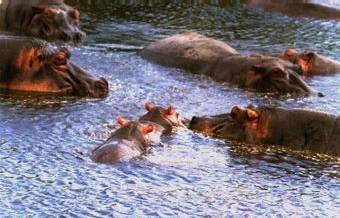 |
| Hippo pool |
|---|
Just as we thought everything was going our way we discovered that Damian expected a tip. This was apparently common knowledge although how we were expected to know this I will never understand. We couldn't work out what was wrong and he eventually told us he wanted 2000 Tanzanian Shillings (About $10 US). We didn't have that much in change. I tried to offer him other things, like $10 worth of cigarettes. This offended him more "You think I am a Masai to be bought with cigarettes". We had reached an impasse. He wasn't going to let us leave without his tip and we had no local currency. Then we thought of a solution. We need to get an extension for tomorrow. The lady in the office can sell us the permit and give us some change from a 50 GBP travellers cheque and we can pay Damian and leave. She begins to fill in the currency forms and the extension. All seems to be going well until it comes to our change. She has no Shillings for Change. We drive off to Ngorogoro lodge to change the money and get the 4th (and worst) exchange rate in 36 hours. Finally we can buy our extension and pay Damian his tip.
At last we can go to the campsite. Maybe not. The woman at the Ngorogoro Crater Lodge didn't complete the currency form. If our declared currency and officially changed currency don't match when we leave the country we could be in all manner of trouble. When we get back to the Lodge she has gone for the evening, fortunately someone else finishes off the form for us. Eventually we get to the campsite at the crater rim. At $10 US a night this is probably the most expensive campsite in Africa. For that you get an unequalled view over the Ngorogoro Crater. No shower, No running water and one blocked toilet.
I positioned the Landrover so the tent would be facing the sunrise over the Crater which was, I hoped, going to be worth $10. We lay down to sleep pondering on why the most wonderful experiences here have to be countered by equal and opposite amounts of disappointment and frustration.
The night was cold and long. The sunrise was, of course, hidden in the grey morning mist which daily brings life to the crater. I should have realised this last night while I carefully used the compass to orientate the truck for the best possible sunrise. The sun eventually broke through the cold mist and began to rapidly warm our chilled bones. We set off across the plains in the direction of Olduvai. There was almost no game here on the fringes of the Serengeti, only a couple of bemused looking giraffe. I assume it had all migrated to somewhere else at this time of the year. On the side of the road there were some Masai dressed in traditional costume with a large disk shaped collar. When they heard the truck they started chanting and bouncing the collars in time. This looked tiring and spectacular. I assume we were supposed to stop and take photographs. It is illegal to photograph the Masai, they themselves demanded that this law was passed. This could be a great disappointment to a lot of tourists as the tall and elegant Masai people are extremely photogenic. Fortunately the Masai will grant you permission to photograph them for a pre-defined fee or gift. We barely resisted the urge to photograph them. About halfway to Olduvai a man stood by the road dressed in some fearsome looking war paint. As we got closer he began to do some kind of dance and shook his spear. We weren't quite sure whether he wanted us to photograph him, give him a lift or slow down so he could poke his spear into our tyres. So we drove on and eventually spotted the small signpost to Olduvai Gorge.
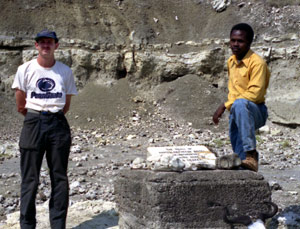 |
| Derek and the Australopithecus Boisei plaque |
|---|
As we drove back to the crater the man in the warpaint was still there. We didn't stop and photograph him. We rounded the corner where the Masai women had been. Only about half the women had their collars moving. Either we had caught them by surprise or they were tired after a hard day's bobbing.
The Masai were obviously exploiting the potential of tourism as much as they could. The Pygmy were being exploited in a similar fashion in Zaire by the other local tribes. In other places the African ethnicity was being exploited by Europeans. At least here, as far as we could tell, the only people exploiting the Masai were the Masai. A few would stand around to be photographed but most went about their business as they had for centuries tending their cattle around the crater pastures.
We headed off on the road to the Malawi border. The scenery was very beautiful but also extremely dry. People were digging for water in the river beds and the cattle looked very weary. The roads were sealed but with potholes so constant vigilance was necessary. I could see a vehicle which looked like a Landrover coming towards us. Fiona shouted "British plates!" as I slammed on what was left of the brakes. A similar event was happening simultaneously in the other Landrover. We both reversed until we were side by side. After the dust cleared we introduced ourselves. Annie and Andy were from Australia and had driven a similar route from England in their late model Landrover TdI. This was probably the genuine 'first TdI in Africa' rather than the authentic 'first TdIs' damaged en route to Richard Leakeys anti-poaching patrol. This one was, however, virtually unscathed and had been completely reliable.
On the final stretch of road to the border we met several some other interesting people, A couple from Malawi in another Landrover, they told us that the road to the Malawi border was appalling and would take us nearly four hours to do a distance of 127 km. He was driving a V8 powered Landrover so I anticipated that it would take us longer. In the end it was quite badly potholed but only took us 2 1/2 hours. Either he was wildly exaggerating for effect or we had become adept at driving on this kind of road. There were also some young missionaries who were trying to establish something similar to the Royal Australian Flying Doctor service here in Tanzania. They were hoping to use small radios powered by hand cranks to allow outlying areas to keep in touch in an emergency. We also met a man from Zimbabwe who was riding a bicycle from Nairobi back to Zimbabwe.
We eventually arrived at the border earlier than expected, partly because the man the previous day had taken so much longer to travel the same road and partly because Mr Michelin had made a mistake in his distance calculations. We expected it to be 390 km. In fact it was 244. Before we could reach the border we had to cross one particular bridge. This was guarded by men in some form of combat fatigues. They didn't look particularly well disciplined or military. They all had AK47s slung nonchalantly over their shoulders. It soon became apparent that, even though it was still early in the day, they were all extremely drunk. We decided to play this one very politely and carefully. In the hut they had the inevitable black book in which to enter our names, our vehicle type and registration number, where we started from and were going to. The man started to fill in the line. His attention seemed to drift part of the way through and he lost his place. He was so drunk that he could no longer find the half finished line on the page. It was a long painful wait watching him slide his finger up and down the page in the hope of finding where he left off. If I impatiently took the pen and filled the line in he may take offence and become violent and angry. If I let him carry on as he was he may get violent and angry anyway. The only thing more disconcerting than a drunk official in an overdressed uniform is a drunk official with a loaded AK47 surrounded by more drunk men carrying more AK47's. He looked up, handed me the pen and said "You finish it". I finished the line with great haste and left smoothly but rapidly. While I had been waiting I noticed that another Landrover with English plates had passed across the bridge in the same direction earlier today. With luck we may meet them later in the day.
The Tanzanian crossing was fairly quick. The locals being processed all seemed to carelessly leave large sums of money in their passports when they handed them over. The officials, without any sign of noticeable guilt, quite openly placed this money in their pockets. The lady in charge of the currency declaration asked us how much Tanzanian money We had. We admitted to 500 Shillings. She pointed out that it was illegal to take the money out of the country so we should give it to her. We did so, although we asked to keep a couple of notes as souvenirs. She walked with us back to the truck and spoke to the man who was about to search the truck. He then briefly glanced in the window and walked off saying 'you can go'. I wondered if the excess 500 Shillings had something to do with this minimal search. Before leaving we asked the lady if any other tourists had come through. She hadn't seen the other Landrover but two people travelling on New Zealand passports had passed through two hours before. Hopefully we would catch up with them. It would be good to meet some people from home again.
In many cases the border posts weren't directly next to each other. In this case the Malawi border post was 30 km away. The border itself followed the river next to the Tanzanian post and the other side of the Bridge was technically Malawi. According to 'Shoestring' Malawi has some very strict rules as to clothing and general appearance. Men cannot have long hair, it will be trimmed for you if they decide it is too long. My hair was still negligible after shaving it all off in Zaire so that should cause no problem. It is also illegal for women to wear trousers or skirts which don't completely cover the knees. From this we assumed that, like many of the North African countries, trousers would be OK as long as they went down to the ankles. On the other side of the bridge there were two policemen. Their job was to ensure that everyone crossing the bridge conformed to the dress standards. They asked us to get out of the truck. They very politely pointed out to Fiona that this was Malawi and she must wear a skirt. She went behind the truck and changed into a wraparound sarong which was deemed acceptable and we could go on our way. Shorts and flared trousers are also unacceptable for either sex. 'Shoestring' also contained the warning that several books were prohibited including communist literature, girlie magazines and 'Shoestring' itself. These books would be searched for and seized if found. This seemed a little hard to believe but nevertheless we hid our treasured copy of 'Shoestring' under the drivers seat.
About half a kilometre along the road we saw two white girls wearing wraparound sarongs hanging on to the back of the local pickup truck which served as a taxi. If these were the Kiwi girls they hadn't got far in 2 hours.



